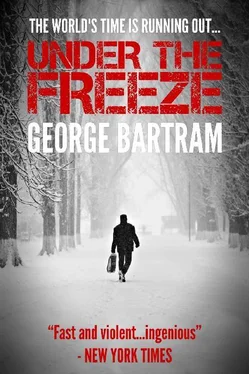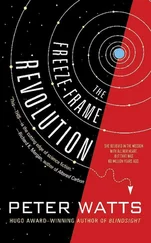“We have our eye on you two. You have one chance. Cooperate with us, or it’s the People’s Court.”
“Sweet Jesu.”
“I will come back tomorrow. If you have said anything about what happened here, I will know you are enemies of the revolution, and I will arrest you on the spot. Understand?”
Uncle Tonio nodded. He elbowed the young man, who groaned. “It never happened.”
“What never happened?”
“Nothing never happened.”
Tarp shoved the pistol into his belt under the shirt and stepped carefully out of the alley. He crossed it quickly and turned a corner and went a block and turned again. Fifteen minutes later he found a street market where it was possible to buy used clothes without coupons, and he bought a dark suit and very shiny black plastic shoes and a white shirt and tie, and he put Buena Ventura behind him and found a public men’s room. It was clean and almost restful after the slum; he changed his clothes and stuffed the clothes from the boat into the trash can.
He went to a barber shop and had his hair cut, and before he could stop the barber he had been doused with sweet-smelling lotion that plastered his hair to his head like a cap. He hated the way he looked, but at least he did not look like himself. He went to a little park where children and dogs seemed to be running back and forth without stopping; there was a small Ferris wheel and a booth for throwing baseballs and a portable instant-picture place where he got two photos of himself. He found a secluded bench and ruined two of the ID cards separating the laminations, then managed to pry a third open and insert one of the photos and then seal it again crudely with the heat from a match from a packet he found on the pavement with “Support the sugar cutters in their drive for productivity!” on the cover. The card was not very convincing, but he judged it to be somewhat better than nothing.
He ate standing up at a cafe back from the main streets, leaning on a wood counter between a truck driver and a black merchant sailor who insisted on introducing themselves and being friendly. It turned out they thought he was a policeman.
“Do I look like a policeman?”
“You look like George Raft. Who but a policeman would want to look like that?”
He wiped some of the lotion out of his hair in another men’s room, but he still looked like a forties gangster.
At seven o’clock he began looking for the Plaza Marti, and he was there by twenty minutes after. He looked with real interest at the beautiful modern building that took up one side of the square and that was the Theatre of Revolutionary Culture. Somehow, a sense of human scale had been preserved despite its size. Three tiers of lighted windows were stretched like bright ribbons across its façade; inside, and outside on terraces with plain, waist-high railings, people were moving, looking at this distance like colored chips swaying on the ribbons. In the vast plaza itself, couples moved in a clockwise whirl with the slow and graceful gait of flirtatiousness. In a larger circle, bicycles moved around them, with one or two now darting through the crowd; at the outer edge, scooters and a few cars moved almost hesitantly, like animals that have wandered into an alien environment.
He crossed the square against the swirl of moving people. Many of the men looked as he did, slicked-down and suited, so he supposed that they were all policemen or else his two informants had been wrong. Then again, nobody else was wearing a white tie on a white shirt with a black suit. The women looked overdressed to him and too extravagantly made up. They affected dark lipsticks and towering hair and stiletto heels. Despite the revolution, it still looked as if Havana were the Las Vegas of the Caribbean.
Juana Marino found him in the crowd. He was looking the other way when he heard her rich voice say, “You have been to a Havana barber!” and she was giggling. She had spoken Russian, which helped to remind him that he was supposed to be a Russian named Yegor Solkov and not a French journalist named Selous (as it said on the packet of documents he had in a pocket), nor a Cuban named Ibazza (as it said on the doctored ID card in another pocket), or even an American named Tarp. “You smell like a Cuban,” she said.
“Is that bad?”
“Oh, well…” She wrapped her hands around his left arm. “It is not yet time to go into the theater. Let us walk.”
“Like the other couples.”
“Yes.” She was wearing a light dress of a lavender fabric that had a sheen like silk, and her hair was piled on one side of her face with a flower in it. Her makeup was sophisticated, rather highly colored, and she seemed to have accentuated the Negroid elements of her cheekbones and her lips.
“You are even more beautiful than I remember.”
“Short memory.” She relaxed her hold and put one hand lightly on his left arm. “Where are you staying, did you say?”
“I did not. I hoped that tonight I would stay with you.”
She pulled her hand away. “Don’t be like that,” she said quickly. “I hate that.”
“I was trying to be honest.” He took her hand and put it in his arm again. “Now I will be less honest.”
They strolled once around the plaza and then turned toward the theater. People were pressing into the lobby in rather happily messy lines. Tarp found them much noisier than an American crowd, and noisier by far than any in Moscow.
“Actually,” she said as she watched him come back with tickets, “you look quite handsome. Even with the Cuban hair.”
“I was scolded when I told you you look beautiful.”
“No, you were scolded when you made what you thought was a sexy remark. Then you not only looked like a Cuban man, you sounded like one. Well, for me that doesn’t work so well, because I am a new Cuban woman.”
“One is not supposed to want to spend the night with you?”
“One is not supposed to say so as if they were giving prizes for such remarks.”
The auditorium seemed as big as the plaza outside. There were two vast balconies above them, an orchestra like a football field; chandeliers the size of buses hung from the ceiling, dark gold and crystal and oddly old-fashioned in such a setting. Tarp felt shrunken by such space and by the thousands now moving into it. “Individualism is an aberration,” she had said, and this theater said exactly the same thing. The only concessions to privilege were a row of loges along the front of the lower balcony, but even those were made subservient to the dominant scheme, having no private entrances and no privacy walls. They were, in fact, showplaces where officials and visitors sat, as much on display there as the performers on the stage. Now, Tarp watched them fill with men and women who were neither Cuban nor Communist.
“Foreigners?” he said to her.
She twisted her head to look up. A breath of perfume reached him. “From the embassies. And delegates to the antinuclear congress from South America.”
He thought he could pick out the Russians and the French. He tried to pass the time by making a game of the nationalities, but finally he had to admit what he already knew too well — that, except for the obvious distinctions, national characteristics were not easily expressed in faces. The Africans were colorful and exotic; the Orientals seemed too pleased with it all. Many of them wore lapel badges that identified them as delegates, including a small, silver-haired man in a wheelchair who came in with two bodyguards, and an older man in a dinner jacket with military decorations that Tarp was sure were British.
“Who’s that?” he said to her, pointing at them.
She shook her head. “I don’t know them.”
They took their places in a box. Tarp thought them an odd foursome, particularly when he saw the bulge of a weapon in one of the men’s coats. Some peace congress .
Читать дальше












